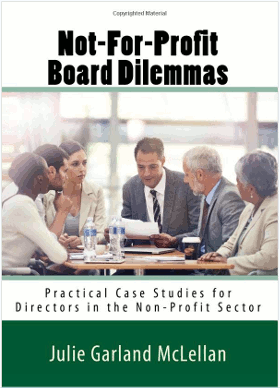|
Book review - Not for Profit Board Dilemmas by Julie Garland McLellan by Julie Garland McLellan
Reviewed by Sue-Anne Wallace, Chair, Australian Council for International Development, and Code of Conduct Chair, Customer Owned Banking Code Compliance Committee.
Governance is the key driver of performance and accountability for both corporate and not-for-profit Australian companies. Julie Garland McLellan's dilemmas - now gathered together in this publication - challenge us to think seriously about how we think and act as directors. She presents her material in an engaging way, with a degree of clarity that exposes ways of thinking which will assist both experienced and new directors to fulfil their roles.
For the not-for-profit sector, increasing interest in transparency and accountability means that directors must shoulder similar responsibilities to their corporate counterparts. Julie's writing on critical situations that arise around the board table provides a pedagogical framework in a most enlightening and entertaining way.
This book is a timely resource and is a welcome addition to director education.
Available at Amazon.com in papaerback and Kindle editions.
|
 
|
|

|
What's new - April was a busy month with international travel, webinars and Australian governance courses.
It was lovely to return to Kuala Lumpur where I facilitated two international governance masterclasses. It is always fascinating to discover the common issues and concerns of boards from countries around the world.
Early in the month I was featured in an interview by ProSpeaker which you can listen to at https://player.whooshkaa.com/episode/?id=97547
As CPA Australia heads into professional exam period I enjoyed assisting aspiring CPAs with their Ethics and Governance topic. The next generation of CPAs will certainly be an asset to their profession! It was a pleasure to meet them all.
Next month is set to be equally busy with a return to Dubai for the Achieving Governance Excellence Masterclass and a visit to Tamworth (which is always a treat).
In addition to my public appearances I have enjoyed, as always, working with my private clients on resolving their board and director issues.
If you would like a confidential director mentor or to discuss your board's needs for training and/or strategy facilitation please contact me at julie@mclellan.com.au.
|
Inspirational quote for May - This month my favourite quote is:
"You cannot escape the responsibility of tomorrow by evading it today."
~ Abraham Lincoln ~
As directors we have a duty to ensure the continued prosperity of our enterprises. That requires us to look into a troubling and uncertain future. We must also be acutely aware of the current environment in which community expectations are increasing and director conduct must attain a new higher ethical level. We face the challenges of a 'VUCA' world where everything is volatile, uncertain, complex and ambiguous. Directors, as ever, need courage.
Lete's meet - I love the opportunity to meet readers (and anyone who is interested in governance) so it would be great to see you at one of my upcoming events that are open to the public:
Better Boards Conference 2017 in Brisbane on 28 to 30 July where I will be helping boards prepare for governing the unpredictable. Details available from Better Boards.
If you would like me to speak for or train your board, staff, audience and/or group please contact me julie@mclellan.com.au
A note on names - A few readers have asked me where I find the names for the protagonists in each case study. I can only say that I 'borrow' them from people I meet or things that I read. Oliver is a name that in English means: The olive tree. The biblical olive tree symbolizes fruitfulness, beauty and dignity. 'Extending an olive branch' signifies an offer of peace. Our protagonist will need to preserve the dignity of all involved in his dilemma and - hopefully - bring the issue to a peaceful solution.
This newsletter - If you have any ideas for improving the newsletter please let me know. If you are reading a forwarded copy please visit my website and sign up for your own subscription.
Suggestions for dilemmas - Thank you to all the readers who have suggested dilemmas. I will answer them all eventually. I could not write this newsletter without your help and without the generous help of all the experts who respond each month to the case studies.
Be a contributor - if you would like to attempt a response to the dilemmas for publication you will be most welcome. Simply reply to this email and let me know.
Farewell until the next issue (due 1 June 2017). I look forward to greeting you again then. In the interim I hope you will enjoy health, happiness and hard work.
Enjoy governing your corporations; we are privileged to do what we do!
Best regards,
Julie




